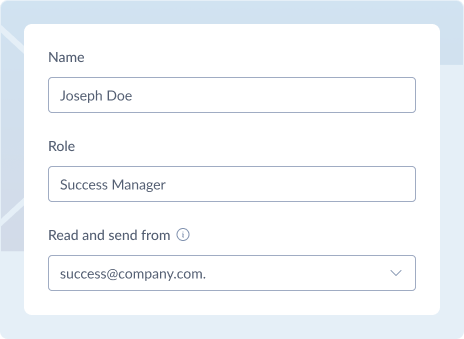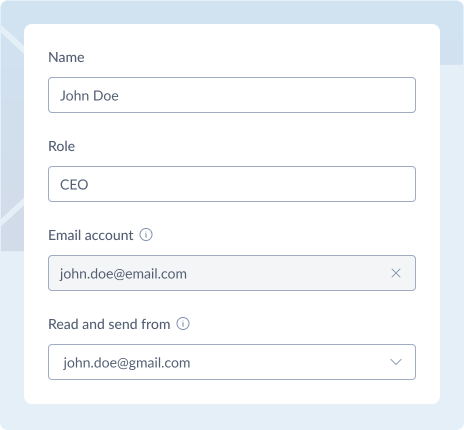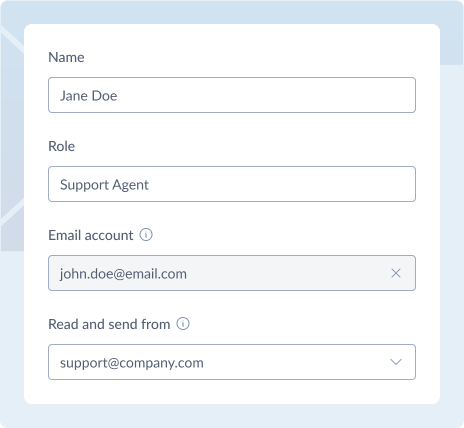Email Personas in Eloquens AI allow users to create customizable AI-driven email identities to manage workflows and automate communications efficiently. Here’s an overview of their utility and how to set them up.
What Are Email Personas?
An Email Persona is a virtual identity configured to:
- Represent specific roles within your organization (e.g., "Support Agent," "Sales Representative").
- Manage workflows using dedicated email aliases.
- Send, receive, and draft emails tailored to your business needs.
- Simplify email communications by using predefined settings for tone, routing, and content.
Why Use Email Personas?
-
Role-Specific Communication:
- Assign distinct roles and responsibilities to each persona.
- Customize responses based on the role (e.g., a Support Agent handling queries vs. a Sales Representative engaging leads).
-
Professional Branding:
- Use branded email aliases like support@company.com or sales@company.com to maintain a professional image.
-
Streamlined Workflows:
- Automate email responses, routing, and tone to improve efficiency.
-
Centralized Management:
- Monitor and manage all communication from a single dashboard.
Set Up Email Aliases (Optional)
- To use Email Personas effectively, consider creating an email alias before connecting to your account.
- Aliases allow you to send and receive emails under a specific identity, such as support@company.com.
- How to Create Email Aliases:
- For Google Accounts: Follow the instructions provided by Google to create aliases.
- For Microsoft Accounts: Use Microsoft’s guide to set up aliases.
Examples of Email Personas
1. Managing Your Personal Inbox (You Are the Business)
Why It Matters: If you're a small business owner or solo entrepreneur, managing customer emails can take up hours of your day. Let Eloquens take that burden off your shoulders.
Example Setup: John Doe runs a small business and wants Eloquens to handle customer enquiries and general inbox replies.
Outcome: Eloquens will reply directly as John Doe, giving a professional impression while saving time.
When to Use: If you are the face of the company, this scenario ensures all emails look personal and polished.
2. Managing a Shared Inbox (Direct Sign-In)
Why It Matters: Shared inboxes, like success@company.com, are often managed by multiple team members. Having Eloquens handle it directly ensures faster responses and avoids confusion.
Example Setup: John Doe wants Eloquens to manage the shared success inbox that his team manually monitors. Sign in directly: Use the credentials for success@company.com instead of your personal email.

Outcome: Eloquens will manage this inbox directly, replying as Joseph Doe, the Success Manager.
When to Use: Perfect for team-managed inboxes like support@, sales@, or success@, where efficiency and consistency are crucial.
3. Handling Company Support (Using an Alias)
Why It Matters: Creating a separate email alias for customer support helps your business appear more organized and professional. It also separates support emails from your personal inbox.
Example Setup: John Doe wants Eloquens to manage his company's support inbox, support@company.com, without needing a separate account. First, create an alias, ensure support@company.com exists under your main email account:
Then, connect your main email account (e.g., john.doe@email.com), and select the alias previously created:
Outcome: All support responses will come from support@company.com, signed by Jane Doe, the Support Agent.
When to Use: Use this setup if you want to separate support tasks from your main inbox without creating a new email account.
Best Practices for Using Email Personas
- Match Persona Roles to Workflows: Assign relevant personas to specific workflows for clarity and efficiency.
- Leverage Aliases: Use aliases to manage multiple identities within a single email account.


Douglas Ho
Comments